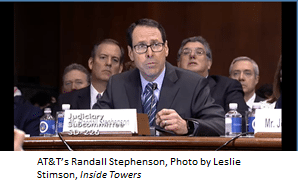
“We want consumers to pay for their content once. This merger will allow us to accelerate innovation. Faster innovation in content delivery will accelerate 5G deployment,” said AT&T CEO Randall Stephenson. That happened when AT&T launched the first iPhone on its 2G network, which sped deployment for 3G and 4G, he added.
At the hearing, Committee member Orrin Hatch (R-Utah) reiterated antitrust concerns; he penned an OpEd for Forbes earlier in the week, writing the central question is whether the deal “will lead to exclusive dealing, improper favoritism, or other acts that narrow consumer choice and reduce service quality.”
Asked about what a combined company might do after the merger would be approved, Stephenson stressed several times it would not throttle certain content speeds over others and not gouge consumers. “We will not withhold content to disadvantage somebody else. We have limited value if we start limiting access to content,” saying that is “not a smart business move” in the internet age.
Entrepreneur Mark Cuban said there needs to be more companies with the scale that can compete against companies like Apple, Google, Amazon and Facebook. He urged lawmakers not to stifle innovators.
Public Knowledge President/CEO Gene Kimmelman said combining companies that have 40 percent of all TV viewers through satellite, wire and wireless customers raises “significant questions.” While AT&T and Time Warner “are doing really good things for viewers in over-the-top” content, the question is “will that really continue” if they’re allowed to combine.
“It is that [combined] market power that concerns us,” Kimmelman said, urging lawmakers to reject the merger “unless they can show these competitive harms will not arise.”
Stephenson said the Justice Department will conduct an antitrust review of the merger, but the companies still don’t know if AT&T will assume any TV or satellite licenses from Time Warner, which would trigger a separate FCC merger review. Also unclear is what happens given a promise by President-elect Donald Trump during the campaign to reject the deal.
December 8, 2016



